Anyone who has raised a teenager, or taught one or has been in close proximity for an extended period of time will appreciate that teenagers cannot be scientists. As you know if you fit any of the afore mentioned categories, teenagers know everything. And therefore, you by definition know nothing, or at the most, very little. That said, scientists actually know quite a lot about one thing. When I ask a scientific question that they know the answer to, they tell me – in great detail and length. Brevity is not always their method because they have so much information about their area of expertise. Now, on the other hand if you ask them a question they do not know the answer to, they will simply say 'I don't know' or 'That's a good question' or 'I am not familiar with that'. And that quite simply will be the end of it. This is rather refreshing actually. They do not pretend to know everything, and so therefore, they can never be mistaken for a teenager. I guess we can all learn a little from the scientists and simply admit that there is a limit to what we know. After all, if you haven't spent eight or more years studying one thing, as most of them have, how much can you know about anything. So you teenagers out there – listen up – it's okay to admit you don't know everything and it's also good to ask questions to people who know quite a lot. Just be sure you have the time to listen to the entire answer – it could take a while. I guarantee that if you have questions there are people who will be happy to answer them, just look for a scientist.
Random Stuff That Happens on an Average Day
But No Days Are Truly Average Here
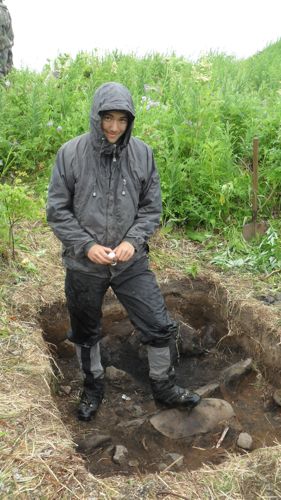 Sean-Paul worked on extending this excavation yesterday. We went up today to see how the progress had gone on their work and the newly discovered large charcoal area was very interesting.
Sean-Paul worked on extending this excavation yesterday. We went up today to see how the progress had gone on their work and the newly discovered large charcoal area was very interesting.
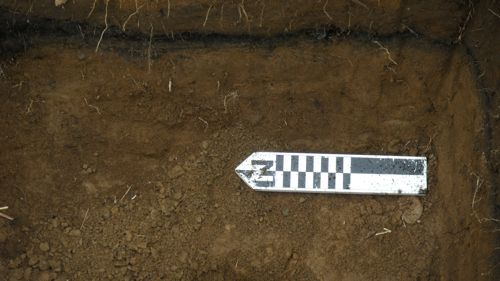 When photographing excavations, archeologists place a directional point to show North.
When photographing excavations, archeologists place a directional point to show North.
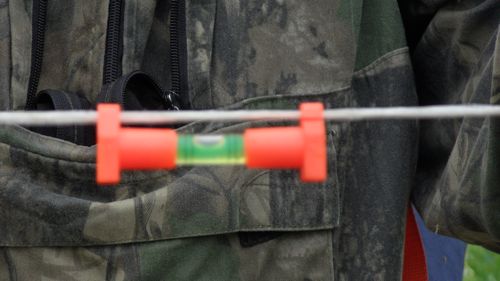 When they are working on a controlled excavation, they use a line level so they can remove a layer of soil in 10 centimeters increments. The line level helps them clear the entire area to the same depth and show continuity of materials in each area, such as bone, tools, stone flakes or other artifacts.
When they are working on a controlled excavation, they use a line level so they can remove a layer of soil in 10 centimeters increments. The line level helps them clear the entire area to the same depth and show continuity of materials in each area, such as bone, tools, stone flakes or other artifacts.
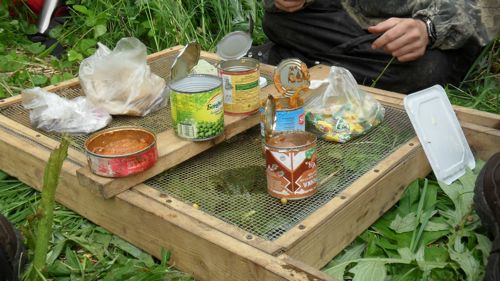 Each day we take a lunch with us to work. We find a birch forest, start a fire and boil water. We cook something like Ramen noodles and open cans with our pocket knives. We are so dirty that we just eat with forks we carry in our backpacks and we use the same knives that we check the soil with to open the cans. Clean if a relative term and we are so hungry that it doesn't really bother us. We just pass around the cans and help ourselves. Then we burn all the garbage in the fire. That way bears won't associate humans with food, which is very important here in grizzly country.
Each day we take a lunch with us to work. We find a birch forest, start a fire and boil water. We cook something like Ramen noodles and open cans with our pocket knives. We are so dirty that we just eat with forks we carry in our backpacks and we use the same knives that we check the soil with to open the cans. Clean if a relative term and we are so hungry that it doesn't really bother us. We just pass around the cans and help ourselves. Then we burn all the garbage in the fire. That way bears won't associate humans with food, which is very important here in grizzly country.
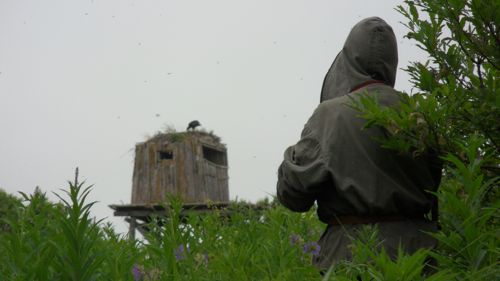 Near one of our test pit sites there is an old abandoned military post. On top a Stellar's Eagle has built a huge nest. He flies in with a fish and begins to eat it and then preen himself. Sean-Paul started to walk toward it to take a picture but, the bird was sure to give a warning call and he turned back.
Near one of our test pit sites there is an old abandoned military post. On top a Stellar's Eagle has built a huge nest. He flies in with a fish and begins to eat it and then preen himself. Sean-Paul started to walk toward it to take a picture but, the bird was sure to give a warning call and he turned back.
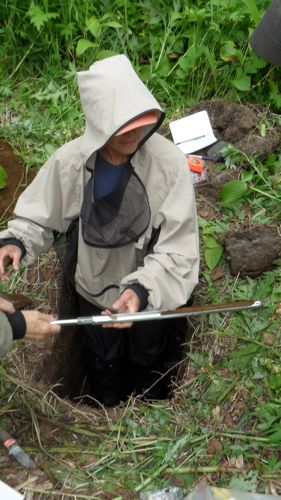 Sometimes after we dig a test pit and discover artifacts, we do a core sample in the bottom. This shows us the layers that exist below the area we have dug. The layers below indicate which volcanic eruption occurred before the people lived there. This helps us date the approximate age of the pit house and artifacts.
Sometimes after we dig a test pit and discover artifacts, we do a core sample in the bottom. This shows us the layers that exist below the area we have dug. The layers below indicate which volcanic eruption occurred before the people lived there. This helps us date the approximate age of the pit house and artifacts.
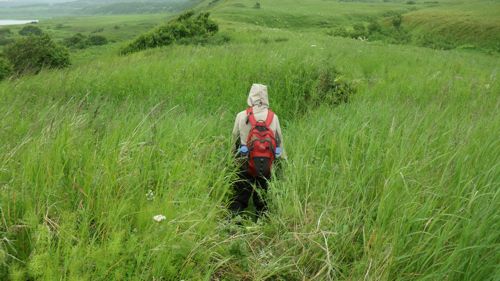 Today we walked back along the ridge that had already been surveyed for depressions. It is about 2 kilometers from camp but, it takes a relatively long time to get there because we spend most of the time walking through tall grass. At the end of the day, every step is an effort. We also use a lot of bear trails which makes some of the travel easier, we just have to make a lot of noise. When there is no trail it is just a slow process.
Today we walked back along the ridge that had already been surveyed for depressions. It is about 2 kilometers from camp but, it takes a relatively long time to get there because we spend most of the time walking through tall grass. At the end of the day, every step is an effort. We also use a lot of bear trails which makes some of the travel easier, we just have to make a lot of noise. When there is no trail it is just a slow process.
Get Well Soon Craig
To our friend Craig, I send you my best wishes for a smooth recovery. I know that right now you are feeling like you have a long road ahead and are not up to taking the first step. Remember that we are all here to help you along. And once you get to the top of the hill, and you will get back there, the rewards will be more than you hoped for.
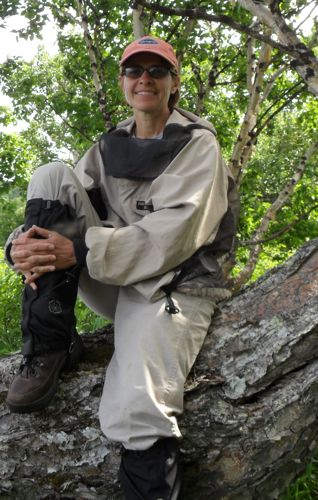 On the way up the hill I went through a lot of mud and muck that sucked my boots down, but when I got to the top of the hill I forgot about those things and just enjoyed being there. People helped me up the trail, and family and friends will help you too. Get Well Soon Craig!!!!
On the way up the hill I went through a lot of mud and muck that sucked my boots down, but when I got to the top of the hill I forgot about those things and just enjoyed being there. People helped me up the trail, and family and friends will help you too. Get Well Soon Craig!!!!
